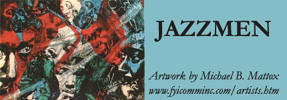|
WHAT IS FUSION?
Friday, 14 Oct 2005
lowman777@yahoo.com
Subject: teach me please
Would anyone like to give me a description of "fusion?" I've heard the
term, probably heard the music, but don't know how to bring the two
together. How did it come to be named that? What is its
background?
On 10/14/05, Jeff Hubbs wrote:
hbbs@comcast.net
I can take this one. Fusion is basically the
overall concept of jazz (i.e., mostly instrumentals in a combination
of ensemble and solo sections, often with melodic "heads" over chord
changes) applied to mostly instrumental rock, blues, and/or R&B
instrumentation and idiomatic playing.
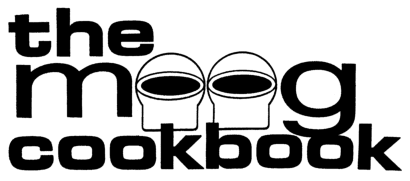
BK: I love the period when you'd see early synth
catalogs, probably before '72 or '73, everyone looked like a scientist.
Nobody had long hair in those catalogs. They weren't pushing that aspect of
it. They had guys in lab coats and glasses working the gear. And then, when
Emerson started getting in the Moog catalogs, '74, '75 especially, and then
Herbie Hancock, Billy Preston and so forth, they were saying "Let's
push these toward musicians because it's cool."
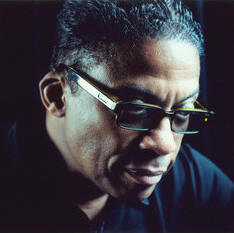
Herbie Hancock's first
ventures into
electronic music started with a
sextet
comprised of Hancock, drummer
Billy Hart and bassist
Buster Williams, and a trio of adventurous horn players:
Eddie Henderson (trumpet),
Julian Priester (trombone),
and
multireedist
Bennie Maupin.
Dr. Patrick Gleeson was eventually added to the mix to play and program
the synthesizers.
Date: Sun, 16 Oct 2005 14:16:51 -0400
From: "Dave Bass"
davebass@mindspring.com
Subject: Oh Lord...
For some darn reason, i just can't help but be dragged back into this
discussion again.
"what is fusion?"
1) MOST, if not ALL of the musics of the 20th century have been classified
according to their RHYTHMIC UNDERPINNING - reggae, bossa, samba, march,
swing, funk, shuffle, etc. ad nauseum. That was before the record
industry became a monsterous money maker in the 50's and a large force in
this society. Since then, they have thrown terms around with less
relation to thier relevance musically or historically than their relevance
in 'brand imaging' - ie. selling crap. For instance - the 'swing'
revival of the late 90's was more of a rockabilly revival than swing.
And the term 'jazz' has been thrown around to just about everything to make
it seem 'cool'.
2) The unique thing that JAZZ brought to the world map was - first and
foremost - it's rhythmic underpinning. This came from Africa, it's
drum rhythms, etc, and was called 'swing' from very early on - a division of
the basic beat into THREES instead of FOURS, (which divides the beat in
NEARLY EVERY OTHER TYPE OF MUSIC - Latin, rock, funk, most classical forms,
etc).
3) Musically speaking, it requires a different rhythmic feel and conception
to 'swing' than to play 'straight' rhythms, though the fine subtleties of
both playing and appreciating swing seem to be further lost with every
succeding generation. The swing of Louis Armstrong vs. Basie vs. Miles
vs. Dexter vs. Bill Evans or Keith Jarrett are all very different - but very
similar in that they 'swing', pseudo-triplet sub-divisions and all.
4) In the late 60's, some 'jazz' musicians, very adept at the art of
'swinging', were caught up in the new rhythmic and social revolution of
'funk' and Rock - james brown, sly and the family stone, the textures and
stylings of Hendrix, etc - you can read Miles in his own words in his
autobiography, which is a valuable read. These players began experimenting
with these rhythms - straight rhythms - but adding their harmonic, melodic,
improvizational and textural ideas. The record companies didn't know
what to call it at the time, (also well documented in the publications of
the day), and a term was labeled but never really pushed or stuck for the
public, for some reason - 'fusion'. Though for all practical intents
and purposes, what the Modern Jazz Quartet was doing was also a 'fusion' -
of classical ideas and jazz.
5) Bottom line - fusion is funk rhythm with 'jazz sensibilities' thrown on
top, whatever that means. I say 'whatever that means', because when
you really LOOK at it - and Bill Evans said it himself - the only unique
thing jazz really introduced to the world was the rhythmic aspect!
Baroque musicians improvised, so also East Indian music, African, etc... so
you can't claim that as 'jazz'. Almost all the harmonic implications
of jazz were spelled out by classical composers beforehand - including
Debussy, Ravel, Stravinsky. And was it Hancock or Evans who said the
only 'new' chord he could find coming from jazz - that wasn't already
present in classical music - was the major 7 flat 5? Melodically too,
all the major concepts were spelled out before - including linear motion,
intervallic motion, and the contrapuntal voices used in Dixieland, etc.
6) No matter what you call it, there is good music and bad music. I
think a lot of the debate between 'jazz' and 'funk/fusion' is made by
musicians, for these reasons:
a) they have personal preference for one or the other. Both,
appreciated well, are like a drug. You can get high on swing OR funk -
or bossa, or whatever. As musicians, it is our addiction. And
addicts are often critical of other addictions. Ever heard a drunk
talk about how terrible cocaine is? Kinda funny, really. We all
have our 'addictions', and most of us are hypocrites about it.
b) some musicians can't seem to master both. Some people swing, some
people funk - hard, in both cases! In Atlanta, you find few that can
really do both really well, or even care to. In bigger cities, that
ratio is higher, I feel. Some may disagree.
c) there was that old resentment from swing musicians in the 70's that going
funk was 'selling out'. Why? Because swing was once king, but
the public's tastes were moved away from an appreciation of swing to
straight rhythmic forms. Sorry - that's just the current state of
affairs. Jazz accounts for - what? - 5-7% of all American record sales
- and Lord knows what they're throwing in that pile! (Can you say
'Kenny G' or 'Najie' - who don't swing, by the way...)
Bottom line - keep the terms pure, mix em how you like, and enjoy them all!
Bass-o-matic
aka Dave Bass
www.davebass.com

Sun, 16 Oct 2005 15:04:23 -0400
From: Steven Charles
saxman7@mindspring.com
Subject: Re: Oh Lord...
On Oct 16, 2005, at 2:16 PM, Dave Bass wrote:
Bottom line - keep the terms pure, mix em how you like, and enjoy them all!
OK Dave, I followed you all the way to your close. What DO you mean by
"keeping the terms pure"? I don't know how that's possible. How can you have
a single definition to cover the vastly broad realm of music considered
"jazz"? What common ground (certainly not swing or "threes")
rhythm-wise can encompass it all? We have "jazz standards" that have Latin,
funky, pop/ballad, rock, or even NO rhythm, so the swing/threes thing
doesn't fit. Is Footprints no longer "jazz" if it's played as a Samba
in 4?
IMHO, I believe it's organic growth has evolved its definition closer to
what Scott delineated in his message, than any more narrowly defined one.
When a Sonny Rollins or Herbie Hancock can feel it's still "jazz" despite
what rhythm it's laid upon, how can any of us argue? Hey, back in the day,
many jazz players & critics thought be–bop wasn't jazz, or some of
Coltrane's stuff was "anti–jazz", and in hindsight, we can all see how SILLY
that all was.......yeah? |

Dear
lowman777:
Your message opens windows and doors to a subject that
tends to divide the jazz community because everyone thinks that jazz is
theirs, and it is.
Unlike reggae, which we accept as being Jamaican or
Caribbean music, or Irish Fugue, which we accept as being Irish, Jazz is the
voice of our people - American, African-American, Latin, Classical (consider
"Django"). What Marsalis and the bulk of African-American musicians regret
is that the European community embraces the music MORE than the
African-American community. Why? Because in the 70s and 80s, jazz became a
commodity, being commercialized by record companies that upped the ante of
the price of a ticket. Pure and simple. The African-American community could
no longer afford to be patrons of jazz at high prices in cabarets, at
festivals and even on records.
Money has always been the drawback for artists. So, when
Kenny G and the Smooth Jazz Era strutted in and took over the "JAZZ SCENE",
making thousands of dollars from record sales, royalties from TV and Radio
ads, and all the money from festivals, leaving the jazz clubs as the only
venues to cultivate the music that African-American musicians continued to
make, a real tear formed in the fabric of the scene. Black musicians were
not working. Only the very top of the heap - McCoy Tyner, Joe Sample, Dianne
Reeves, those who were the darlings of the festival scene in Europe - were
really reaping any benefit from their music production. In other words of
the CULTURAL PRODUCT of the black community was only valued by those outside
of the community because of economics.
The Marsalis Camp - Ellis, Branford, Wynton, et al - rose
to the top of the heap in multi-directions. Branford led the band on late
night TV. Wynton stepped into Lincoln Center with bravado. Ellis held up the
education end with IAJE. So, they were the spokesmen, the ambassadors from
the world that loves jazz to the black community. Questions arose as to
whether or not Ken Burns used Marsalis or vice versa because Marsalis didn't
get paid to do the interview and other musicians refused to be interviewed
for free. Marsalis was in a position to be interviewed. He was head of the
Jazz Department at Lincoln Center. If he were white, there would be no
question as to if or why he was part of the Ken Bern's jazz documentary.
But, Marsalis always leaves the door open to his involvement with the black
community, whether blacks or whites think so. Of course, he's elite. He's at
the top of the heap. You have to be reserved to even get there. But he
doesn't forget where the music came from and for that I applaud him as a
leader in the world of music.
Jazz is cookin' with potatoes and grits
Standin' up each time you get hit
Jazz ain't nothin' but soul
Jazz is livin' high on nickel and dimes
Tellin' folks 'bout what's on your mind
Jazz ain't nothin' but soul
Trumpets cussin' saxophones
Rhythm makin' love
Hustlers wearin' fancy clothes
It's the voice of my people
For me it is all the truth to be found
Never mind who's puttin' it down
Jazz ain't nothin' but soul
(Music and Lyrics by Norman Mapp)
(Recorded by Betty Carter, Joe Lee Wilson and Joan Cartwright)
Peace and Music,
Diva JC
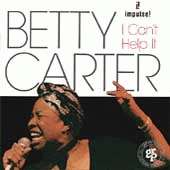
Jazz (Ain't Nothin' But Soul) by
Betty Carter
And finally, as to the 'african' influence in jazz -
Jazz was a COLLISION - A collision of a few cultures and
a unique social fabric. Slaves that landed in the West Indies developed a
very different musical gumbo with the existing music than they did here.
Everyone always wants to point out one distinct part of that collision, but
it is a testament to the blending of humanity and cultures that we have jazz
at all. Swing applied to western instruments, western harmony, western
melody. Take one part out - for instance - if not for western instruments,
African Americans might still be playing talking drums. Which would be a
HELL of a lot better than the crap I hear in dance clubs now. Have you
been to Buckhead lately on a Friday night??
Dave,
First, you really have a great sense of humor in your
writing. Thanks for that.
I spoke about "ownership", not "influence" when it comes
to jazz and Africans. Truth be told, African slaves in America created a lot
of their own instruments, much like they did in Africa. They didn't only
play drums, which, by the way was a feminine invention. They have many, many
stringed instruments in Africa and you can do your own research on that.
From wash tub scrapers to homemade banjos to spoons and
harmonicas, blues men played anything they could think of to make the music.
The real problem is that, since Africans were considered second-class
citizens (and I am using "citizens" very loosely, here), their
cultural product was thought to be owned by their owners.
Nothing has changed. Nothing that has come from the
community of Africans living in America has value in the eyes of not only
the "owners" but the "slaves" themselves. You see, it is very difficult for
non-Africans to understand the African experience in America, because it is
truly based on the double standard. All things are not what they seem.
It may seem that Africans in America are better off in this century but the
mere fact that they and the community-at-large do NOT value their cultural
production in jazz, unless it's something on Billboards best selling list,
makes it very difficult for innovative jazz artists to prevail in the
industry.
Pop artists, Michael Jackson, Whitney Houston and too
many others to name seem to stay in a "bad place" no matter what level of
success they achieve. Is this simply because they are rebelious and
non-law-abiding or is it because no matter what they produce, musically, and
no matter how much financial success they achieve, they are STILL BLACK IN
AMERICA, an unfriendly place for people of most nationalities in the
non-white category. It's sad to say, but America has been such fertile
ground for racism that despite the progress that has been made in the civil
rights arena, the atmosphere for bias is thick here and many people, poor,
rich, educated and not, who are of African descent just cannot reach goals
that they probably would have accomplished had their ancestors not been
treated like animals, owned and operated by capitalist bigots.
So, whether we want to admit it or not, jazz, jass, etc.
is the product of Africans in America. They are the innovators of a music
that future musicians, black, yellow, red and white, have taken to be their
own. I've worked with musicians from five continents. Japanese pianist Kuni
Makami worked with me at the Blue Note in NYC, in the 80s, a gig I will
never forget, because Kuni is baaaaaddddd! I know that Swiss musicians swing
differently from Italians, that South Americans have far more interesting
rhythms than Austrians. Ironically, the musicians I sang with in Ghana
didn't know the American song book as well as Sicilians, who are great but
still don't have the groove that Dr. Lonnie Smith put me in for 10 years in
Fort Lauderdale. It's so evident on my new CD,
In Pursuit of A
Melody CD by Joan Cartwright -
www.fyicommin.com
(http://www.fyicomminc.com/inpursuit.htm),
a compilation of jazz, blues, pop, techno, hiphop and piano music, which I
will be airing on WCLK (91.3 FM) in Atlanta, on Thursday evening with Renee
Williams at 7:00 p.m. Listen online at
www.wclk.com (This is a public service announcement!)
In the final analysis, just like in psychoanalysis, until
we face the facts, we will never begin to heal. American musicians take a
lot for granted by saying that jazz is a blend, mixture, collision of
cultures, which it very well is, but you don't see the musicians of the
world embracing Japanese Kabuki, Irish Fugue or Hungarian Rhapsody, the way
they embrace African American Jazz and Blues. The reason is that the
syncopated rhythms of Africa lend to music an excitement that is absent from
most other music from around the world. That is the sole reason for the
popularity of reggae and latin music - the beat! - which, of course, is
absent from most European music. This does not mean that European classical
music has no virtue, because it does, it is inspiring, to say the least, but
you are not going to jump up and twist your hips to most of it. And when the
rhythm hits you from a blues tune or from Basie's swing, you gonna get yo
butt up and dance! It's a Black Thang, Baby. So, get to it and keep swingin'
cause it ain't goin' nowhere and it's in your soul!
LOVE, MUSIC AND LIGHT,
Diva JC

 |
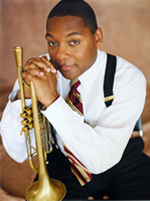
IS MARSALIS RACIST?
From:
lowman777@yahoo.com
Subject: your opinions
Yesterday, I happened to have a long conversation with a very interesting
young man. He's quite intelligent and quite talented in music,
particularly interested in the more liberal extremes of jazz. He made
a comment that intrigued me and I wonder if it's an opinion held by many:
He said that "Marsalis has done much to destroy jazz." I asked for
clarification and he said Marsalis "thinks jazz is only a black man's music"
and that, being in the public position he is as an authority on jazz, tends
to limit the free range of what jazz is meant to be.
Noting that he was almost angry over these issues, I didn't think it wise to
argue the points. However, I've always enjoyed Wynton Marsalis -
whether he's playing classical or jazz. I think it's great that
today's listeners are probably more aware - and appreciative - of jazz than
they'd be if Marsalis weren't so "known," eclectically.
Fri, 14 Oct 2005
From: "Fugate, Scott"
sfugate@brenau.edu
Subject: your opinions
I recently had the "what is jazz" discussion" at my radio station. It
is interesting how it seems to pop up again and again -- whether it be on
this list, in discussions between musicians, or between DJs and Program
Directors at radio stations. We can usually come to a common
consensus. . .but if often takes a fight to get to the point where we
realize that we all actually agree with each other in spirit if not in
specific technique.
Jazz is a topic that a lot of people are passionate about, probably because
it is tied into the very core of American culture and our national identity
as well as our individual concept of aesthetics and art.
As Eric said, jazz is indeed "a blues-based form of music making use of
particular rhythms, all of which have some element of swing to them. Most
importantly, jazz is a music of dialog, a "democracy on the bandstand" that
is propelled by improvisation."
However, there is another aspect of jazz that I am quite passionate about --
and often gets me into arguments. I see jazz as a metaphor for
American democracy itself. . .and it is at the core of the melting pot from
which our overall society arose from.
I wrote out a defense for my view of jazz in the discussion I was having
with my DJs at WBCX, and thought I'd share them with this list. Read
or delete -- just don't stone me.
****************************
Jazz arose specifically from the blending of African, Island, and
European music performed primarily by African Americans and a few Creoles. .
.but it was also the birth of multi-culturalism, and continues as a beacon
of unity and democratic equality to this day.
The early jazz players incorporated everything they heard around them into
improvisational quotes -- as do many jazz players today. Jazz is not
only a dialog between musicians -- but a dialog between cultures which ties
together disparate forms of musical expression.
If you leave out any of the history of music, or any of the advances or
evolutions in music to be blended into the continually evolving jazz melting
pot . . . you lose the essence of the gumbo from which jazz emerged.
Many musical styles came to it, and emerge from it. . .similar to adaptation
in nature. A bird might have flown to North America from another continent
-- adapting to our environment, and over time through cross-breeding and
general naughtiness . . .a new truly American bird is born. Thus, jazz
took all that European, African, South American, and Island music and
blended it into a new genre or species. . .from which many other forms have
arisen through adaptation, cross-breeding, etc.
Rock and Roll & other 20th century musical forms evolved out of jazz --
fulfilling a cultural need that jazz was ignoring at the time. . .and the
fact that the majority of jazz musicians pretty much ignored the cultural
need which rock and other musical styles gave voice to caused jazz to become
almost irrelevant as far as mainstream culture goes.
However, some genuine innovators and artists such as Miles Davis, Herbie
Hancock, Stanley Clarke, and many others realized that the voice was the
same voice which first gave utterance to jazz. . .thus creating "fusion".
Currently, hip hop is addressing a cultural need, and giving it a voice --
whether we like it or not. Parents are responding to hip hop the same
way they did to rock before it, and jazz before that.
Other musical styles are not as malleable as jazz -- which is one of it's
greatest assets, as well as one of it's most contentious points! Rock
can not really incorporate hip hop, or it won't be rock anymore. . .however,
if jazz ignores hip hop it will no longer fulfill the essence of what jazz
was created to be. If jazz refuses to acknowledge other forms that are
related to it's own origins, it ceases to be relevant. I don't see jazz as
just a "style" -- it is a art form which allows for improvisation and
continual change. It is a metaphor and expression of Freedom!
I see it as an art form capable of adapting into all the styles that it has
fathered throughout the 20th century, and continues to breed throughout the
world.
There are a few things that must remain constant for jazz (syncopation &
improvisation in particular), and many forms of jazz that could be called
apostate. . .but the bottom line is that they started the same way.
In some ways, there are styles of hip hop and rock right now that are closer
to real jazz than many artists that claim to be playing jazz (smooth or
otherwise) due to the fact that there is not syncopation, swing, or
improvisation.
I am considered heretical by many jazz musicians and fans because I am so
inclusive. I have had people argue with me for years because I see
most 20th century musical forms as an extension of what I call the
"jazz continuum".
As I said, it's like democracy -- many people interpret it in different
ways. . .but the fact of the matter is that we are allowed to disagree based
on the fact that we have a democratic culture. One view of democracy is not
necessarily more correct than others, but the arguments abound. . .and in
the midst of it all, democracy still allows for a divergent of opinions.
Jazz is a complete democracy in the best sense of the word -- and thus,
people argue about what it actually is. Democracy and jazz must make
room for pretty much all opinions, even though that inclusively will
infuriate those that have a smaller definition for what both encompass.
Jazz functions as an archetypal metaphor -- encompassing our constitution,
the freedoms we cherish, democracy at it's best, the work ethic of any craft
or art, as well as a wonderful example of best practices for any corporate
or team planning. . .and even my own personal faith.
In jazz, all people work off of a common melody -- but there is freedom of
interpretation and expression within that melody.
There are specific rules in the structure of jazz -- but if you follow the
structure there is complete freedom of individuality.
The more structure and technique one learns, and the more one studies and
practices the skill of their craft. . .the more freedom they may have to
express their personal creativity, emotion, and voice.
The only way jazz works is if each artist listens to one another -- freedom
is only found in the listening and responding to each other. When one
artists goes off on their solo without any thought of the others, or the
structure of which they are part. . .the whole thing falls apart.
If jazz is done right, it is done only once. . .it can never be imitated,
only recreated fresh with each new interpretation.
Jazz can not be created in a vacuum, it can not be put in a box, it must
constantly be aware of everything happening around it -- and adapt or evolve
-- or it will suffocate (as it has been doing for quite some time).
Jazz could not exist if it wasn't for the blending of all cultures found in
America throughout our history. . .if you leave a culture out or lessen the
importance of any aspect of it's cultural heritage -- the art form
diminishes.
Every artist has equal importance in a jazz band, every member has their own
voice, and if one member takes more credit than the others the band falls
apart.
Jazz takes every rhythm and increases it. It takes every melody and
experiments with it. There is a structure, but the purpose of the structure
is to allow each aspect to go beyond it.
Jazz takes each instrument and allows that instrument it's own voice --
there are no background musicians in jazz. Those artists that feel their
personal craft is more important than the rest of their bands often end up
penniless and destitute.
Ego kills jazz, and has killed some of it's greatest innovators. Anything
emerging from ego tends to serve as an end unto itself, and jazz illustrates
this throughout it's history better than everything else ego destroys.
However, the irony is that there are few areas where an individual can have
a more specific voice and express their own personality as much as through
jazz.
Just about every aspect of jazz allows for change based on creative
interpretation, cultural adaptation, emotional expression, personal freedom,
and awareness of all that surrounds it.
Jazz is not just a theory, it is not just a structure -- and to me, it's not
just a style of music. . .it is at the core of the multi-cultural blending
that has made America great, it is at the core of that which makes my soul
sing.
So. . .that's why it is important to me, and I bother engaging in this
debate. :-)
Scott Fugate |


